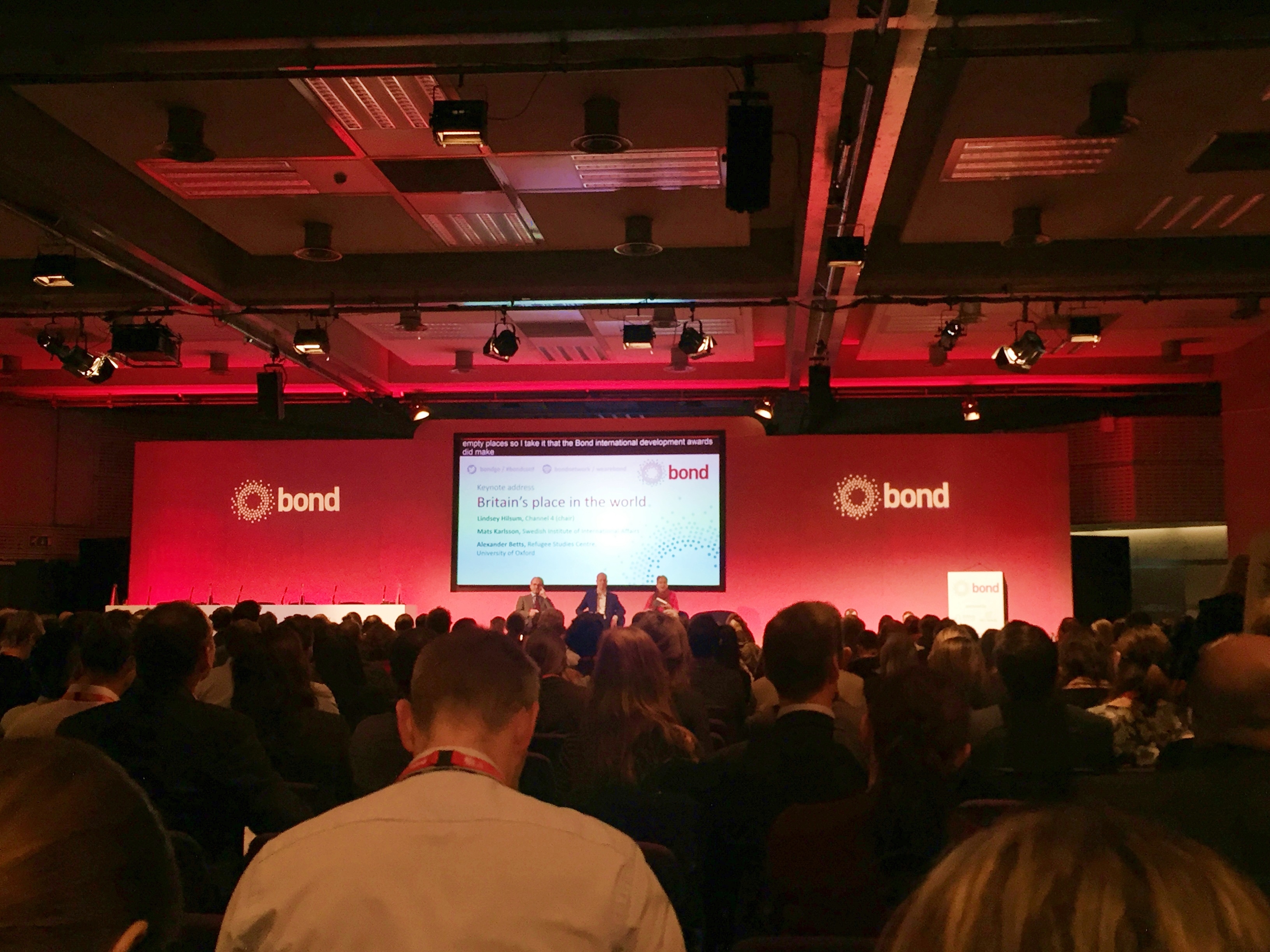In a world of ever-increasing uncertainty, organisations would be forgiven for feeling tentative and cautious. However, the start of the Bond Annual Conference 2017 declared that this is not an option – instead, civil society must confront uncomfortable questions and demand more of themselves and their governments
From the QEII Conference Centre, staring out at the sights which define London’s political, historical and financial institutions over a muddy grey sky, this year’s Bond Conference began with a palpable sense of political bewilderment, a need for answers and a desire for a rudder in a world beset by change.
 The Rt. Hon. Priti Patel MP, Secretary of State for International Development, reiterated mantras to attempt to calm frayed nerves. ‘We must stand up for the very rights that we cherish,’ she said, ‘as we face unprecedented humanitarian challenges.’ Patel took her keynote address to announce the creation of a ‘Challenge Fund’ for small UK charities with an annual income of less than £250,000, thereby increasing DFID’s support for grassroots NGOs.
The Rt. Hon. Priti Patel MP, Secretary of State for International Development, reiterated mantras to attempt to calm frayed nerves. ‘We must stand up for the very rights that we cherish,’ she said, ‘as we face unprecedented humanitarian challenges.’ Patel took her keynote address to announce the creation of a ‘Challenge Fund’ for small UK charities with an annual income of less than £250,000, thereby increasing DFID’s support for grassroots NGOs.
A stronger message came from Achim Steiner of the Oxford Martin School and ex-UNEP. He took to the stage with words ringing out of the ‘assault’ on the International Development consensus and the ‘brutal failures’ of developed nations. ‘Public policy discourse needs to be faced head-on,’ he demanded. Moving forward, what is needed – partnership, collaboration, solidarity, leadership – can now be found when we look to the global south.
It was from this speech that we then moved to the morning session: ‘SDGs: Our chance for real change’. Here again, the audience was asked to consider how we make SDGs more than merely a righteous declaration. There was a general consensus that progress must be measured through targets – and once measured, we then can take action. The challenge is not that the SDGs are ‘too big’ or ‘too complicated’, but rather the issue is one of engaging the public. The SDGs should be viewed as a foundation for collective and shared action – a national conversation.
 Development connects us in complex ways and civil society has a vital role in building momentum and piling the pressure on our respective governments. More must be asked of those in charge. The belief in the SDGs’ powerful and transformative agenda, and the exasperation at governments already stumbling, was palpable. The last question to the room, however: ‘What is the cost of ignoring them?’ was left uncomfortably unanswered.
Development connects us in complex ways and civil society has a vital role in building momentum and piling the pressure on our respective governments. More must be asked of those in charge. The belief in the SDGs’ powerful and transformative agenda, and the exasperation at governments already stumbling, was palpable. The last question to the room, however: ‘What is the cost of ignoring them?’ was left uncomfortably unanswered.
Discussions happening outside of the sessions spoke of how organisations now have to make opportunities; they can no longer afford the luxury of biding time. That the third sector has woken up to the need to be more precise about impact – not just to donors, but to the people they serve. The need is now to share, to collaborate, to be bigger.
The closing keynote of the first day was huddled around the theme of ‘transformation’. The audience could collectively take a moment and pause, after talks which had deconstructed the face of the public, the hope placed upon SDGs, the meeting spaces which reiterated urgency. Here, at the end of the day, Jan Egerland, Secretary General at the Norwegian Refugee Council and Special Advisor to the UN Envoy for Syria, stood weary but defiant.
He addressed the delegates, sharing chilling humanitarian stories with cold and uncompromising statistics, and yet with the hope that civil society can, should and will do better in securing protection and rights for all. We started the day with many open-ended questions and with a need for guidance. The answer is as unwaveringly simple and astonishingly complex as you would expect from today’s world: the old ways are dead. We need to transform.
For more on development transformation, see the Alliance special feature on Community Philanthropy.
Amy McGoldrick is Alliance’s Marketing and Advertising Officer.



Comments (0)